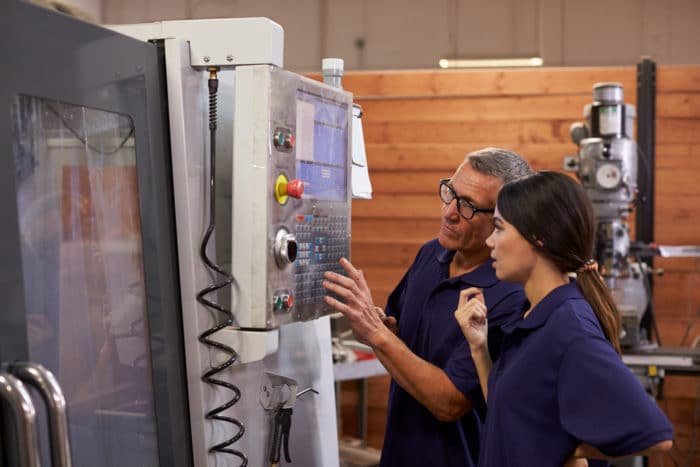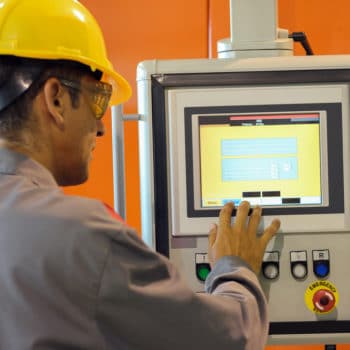Why We Love It
-
$39,620Potential Avg. Salary
-
-20.5%Job Growth Rate
-
Don't Take Work HomeCareer Attribute
-
Office Work EnvironmentCareer Attribute
CNC stands for computer numeric control and a CNC programmer is responsible for writing programs for electro-mechanical devices that support the manufacturing process. This is especially important because CNC machines function according to the code included in a computer-controlled module.
Recommended Schools
What is a CNC Programmer?
Duties
CNC programmers work with fast paced teams and are in charge of the following functions:
- Establishes the manufacturing sequence for machines and select the appropriate cutting tools for cutting desired shapes.
- Oversees job orders, blueprints and machine specifications for designing programming that influences machine speed, tool selection and calculating dimensions.
- Provides feedback on process improvement regarding CNC machinery to the respective department.
- Ensures that machine operations are in compliance with ISO requirements and safety regulations.
- Undergoes training programs that will lead to better performance and personal development in this area.
Day In The Life
On a day-to-day basis, the main work assigned to CNC programmers involves determining the sequence by which manufacturing machinery like those that fabricate metal and non-metal parts, will run. This sequence includes a series of numbers that specify commands like when to cut the product, at what speed and which type of cut should be used.
Using computer software, you have to revise and rewrite programs (e.g. FANUC G-code programming) complete with tool, fixture and set-up requirements, and monitor it for any errors. The main aim is to reduce setup time and machining with minimum supervision. Resolving issues in collaboration with the production team is a big part of the job.
You also have to keep a close eye on machines that run on trial and carry out computer simulations for efficient functioning. Other work on the typical day includes designing geometric layouts via computerised drafting software or by hand using graph paper. You are expected to work alongside other staff to maintain and organize the machine shop work environment. Effective communication skills come in handy as well, when you have to put together instruction sheets for machine controllers to use.
Work Schedule And Typical Hours
In this job sector, employment is full-time (i.e. 40 hours a week) with work assigned in shifts. Occasionally, a CNC programmer has to work on evenings and weekends. The typical working environment is either an office building or a shop floor, using computers and computer technology to design and test numerical control programs for producing metal and plastic parts. Noise level in this type of work environment can be medium to high.
Growth Of The Job
Through 2014-2024, the demand for CNC programmers will be steady according to the US Bureau of Labour Statistics. CNC programmers that are working with metal or plastic will find more job opportunities, with a 19% increase during the same period. In 2006, 89% of CNC programmers were working as computer-controlled machine tool operators versus 11 percent that worked on numerical tools and process control. Due to the lack of people entering training programs for this profession, industries will continue to find it difficult to hire quality workers with the right kind of knowledge.
Typical Employers
There are a wide range of employers in the manufacturing and production industry that require the services of CNC programmers. Employment is usually focused on fabricated metal products manufacturing, transport equipment manufacturing, machinery manufacturing. For instance, organisations such as CooperVision, Exova, Hunting Energy Services, Hastings Manufacturing Company, East End Welding, Magnum Steel Works, Alpha Manufacturing and Design.
Recommended Schools
How To Become a CNC Programmer
To become a CNC programmer, an individual must have at least a high school diploma. Entry level career opportunities require candidates to acquire the necessary skills with a few weeks of training on the job. This is only after you have several years of training and background in CNC programs. Experience can be attained by getting a CNC Programmer certificate or an Associate’s degree in Applied Science, specializing in machine tool technology. You can also work as an apprentice in the industry, to gain fist hand knowledge of shop practices, CAD software, blueprint reading, etc.
CNC programmers must be comfortable wearing safety gear like goggles or earplugs when working in proximity to machine tools, coolants and lubricants. In this role, one needs to keep pace and adapt to a quickly changing environment, with the skills to optimize machinery and tools. A high level grasp of mathematical computations can help to interpret a range of technical instructions during the work. You may also have to lift heavy items and stay on your feet for most of the day.
CNC Programmer Salary Data
We’ve provided you the following to learn more about this career. The salary and growth data on this page comes from recently published Bureau of Labor Statistics data while the recommendations and editorial content are based on our research.
National Anual Salary
Low Range
$30,100Average
$39,620High Range
$58,720National Hourly Wage
Low Range
$14/hrAverage
$19/hrHigh Range
$28/hrHow do CNC Programmer salaries stack up to other jobs across the country? Based on the latest jobs data nationwide, CNC Programmer's can make an average annual salary of $39,620, or $19 per hour. This makes it an Above Average Salary. On the lower end, they can make $30,100 or $14 per hour, perhaps when just starting out or based on the state you live in.
Salary Rankings And Facts
#535 Nationally for All Careers
Programs and Degrees
Here are the most common degrees for becoming a CNC Programmer. a is usually recommended and specifically a degree or coursework that prepares you for the particular field, see below.
Highest Education Among CNC Programmers
- 0.1% Doctorate
- 0.3% Masters
- 2.7% Bachelors
- 5.1% Associates
- 19.3% College
- 51.5% High School
- 20.9% Less than High School
Job Growth Projections and Forecast
2014 Total Jobs
22,4002024 Est. Jobs
17,800Job Growth Rate
-20.5%Est. New Jobs
-4,600How does CNC Programmer job growth stack up to other jobs across the country? By 2024, there will be a change of -4,600 jobs for a total of 17,800 people employed in the career nationwide. This is a -20.5% change in growth over the next ten years, giving the career a growth rate nationwide of Below Average.
Growth Rankings And Facts
#788 Nationally for All Careers
What Companies Employ The Most CNC Programmers
| Industry | Current Jobs | New Jobs Needed | % Increase |
|---|---|---|---|
| Machine shops | 4,500 | -900 | -1% |
| Agriculture, construction, and mining machinery manufacturing | 1,900 | -300 | 0% |
| Metalworking machinery manufacturing | 1,600 | -400 | 0% |











